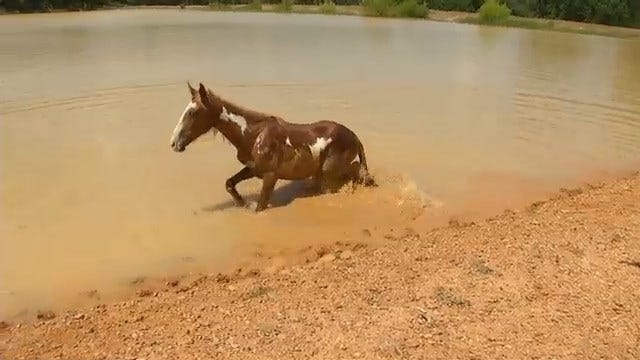Volunteer Dedicates Life To Preserving Oklahoma's Heritage Horse
<p>Once plentiful, the horses were on the brink of extinction following the Civil War, and again in the 1970s; but thanks to the work of volunteers the horse is making a comeback.</p>Monday, July 21st 2014, 11:04 pm
The Oklahoma Colonial Spanish Horse is the official heritage horse of Oklahoma. Once plentiful, the horses were on the brink of extinction following the Civil War, and again in the 1970s; but thanks to the work of volunteers the horse is making a comeback.
The horses have a rich heritage, and have shown resilience and perseverance to thrive in Pushmataha County in southeastern Oklahoma; and one Oklahoma man has made it his passion to look out for the horses.
There isn't a day that passes when Bryant Rickman doesn't think of the horses. He looks after them and he thinks about their past and their future.
The Spanish Mustangs, more specifically, the Choctaw Indian ponies who've survived and thrived in Oklahoma's Kiamichi Mountains for centuries, are dear to his heart.
"Last free roaming pure Spanish horses in the United States,” Rickman said.
Spanish mustangs descend from horses brought to the Americas beginning in the 1500s.
"They come with the Spanish explorers, Conquistadors and all," he said.
Many Native American tribes ended up with the ponies, renowned for their endurance and gentle dispositions. The Choctaws brought them along during their forced removal from Mississippi to Indian Territory.
They're small in stature, but the ones once owned by Choctaw families near Blackjack Mountain in Pushmataha County, are a big part of Rickman's life.
But this bloodline of stock once nearly disappeared forever, as many were crossbred or replaced by larger horses.
"These were the base horses for a lot of breeds," Rickman said.
Only a small herd remained, roaming free on Blackjack Mountain.
"There wasn't but nine females and five males, anywheres that could be found in Oklahoma that was recorded in the registry," he said.
A man named Gilbert Jones began breeding the Spanish mustangs in 1923. Rickman, a close friend, carried on the tradition when Jones died, trying to save the bloodline of ponies which have grazed on Blackjack Mountain, living off grasses, and berries and a will to survive.
"These are what Mother Nature, survival of the fittest have made," said Rickman. "It's amazing to me, that there has been a place where they could do that, and the only place was here in southeast Oklahoma in these rugged mountains, where people couldn't get to them and intervene."
With fewer herds of pure Spanish horses remaining nationwide, especially free ranging herds, and with so few Choctaw Indian ponies still in the Kiamichi Mountains, man had to intervene.
The retired vocational agriculture teacher spends much of his time in his truck on mountainsides, winding around on logging roads, checking on the horses, removing them from timber company lands to private leases when needed.
"If you had any kind of an equine interest, and you didn't get to know these horses, then you've missed out on something," said Rickman.
He heads up the Southwest Spanish Mustang Association, which sells the horses only to those committed to preserving the bloodline.
The group is now responsible for 250 of the horses on a daily basis, which can't be done without support from people worldwide who are fascinated with the horses; their history and their survival.
"We have had some really, really great people all over the United States for the last several years that have sent money to buy feed, directly to our feed stores or whatever, to buy feed to keep them going," Rickman said.
Even though the ponies have increased in number, the livestock breeds conservancy still considers their status critical. So Rickman will keep working, spending much of his time on a mountainside with the horses and his passion for preserving them.
"This is a very, very important part of our history. These were the first horses in America," he said.
Rickman's short term goal is to find places to put the horses. The more long term goal is to raise awareness about the breed and get other partners involved to help preserve the bloodline.
?More Like This
July 21st, 2014
February 22nd, 2022
February 22nd, 2022
February 22nd, 2022
Top Headlines
December 11th, 2024
December 11th, 2024
December 11th, 2024
December 11th, 2024










